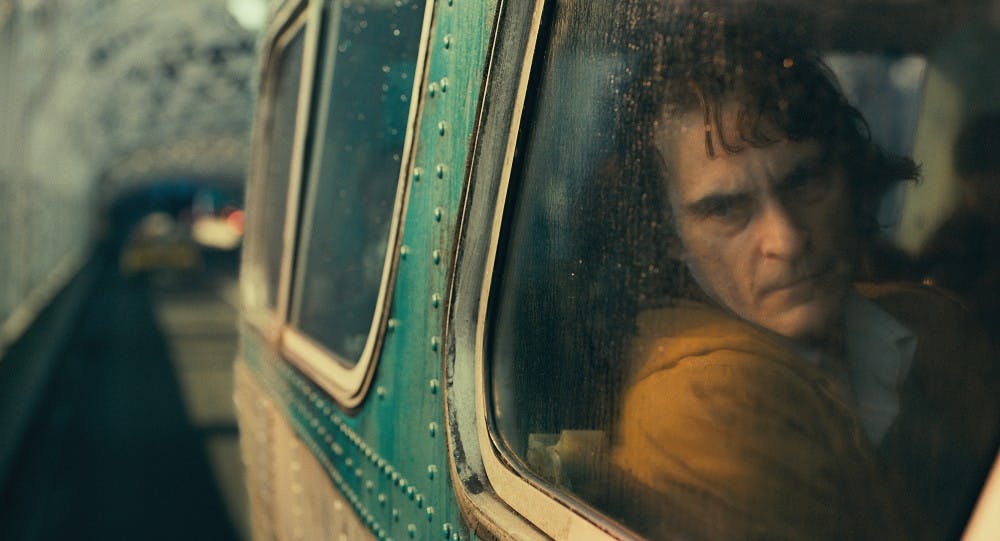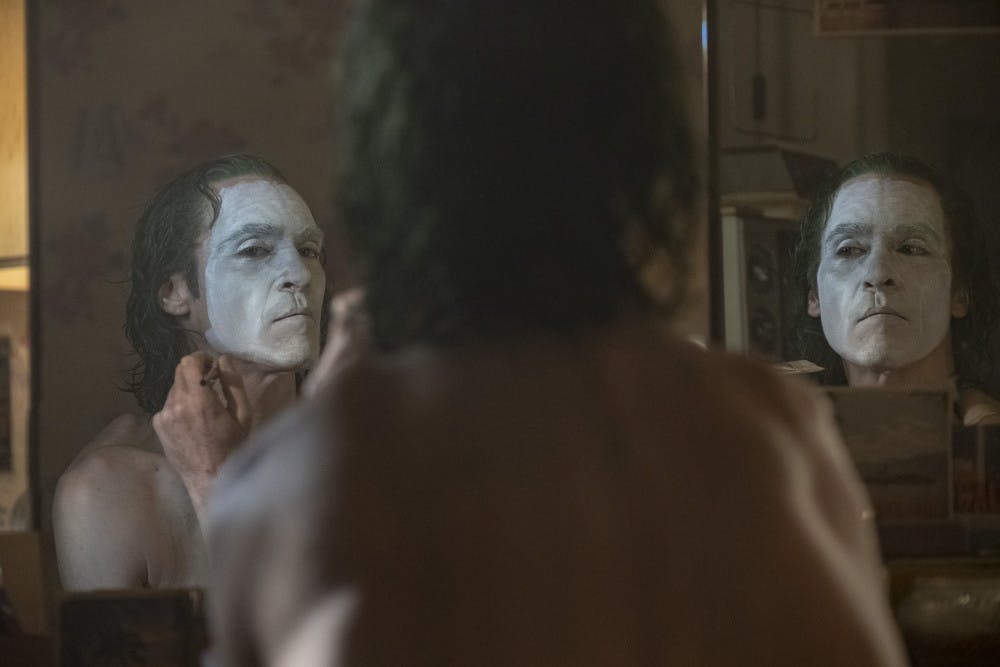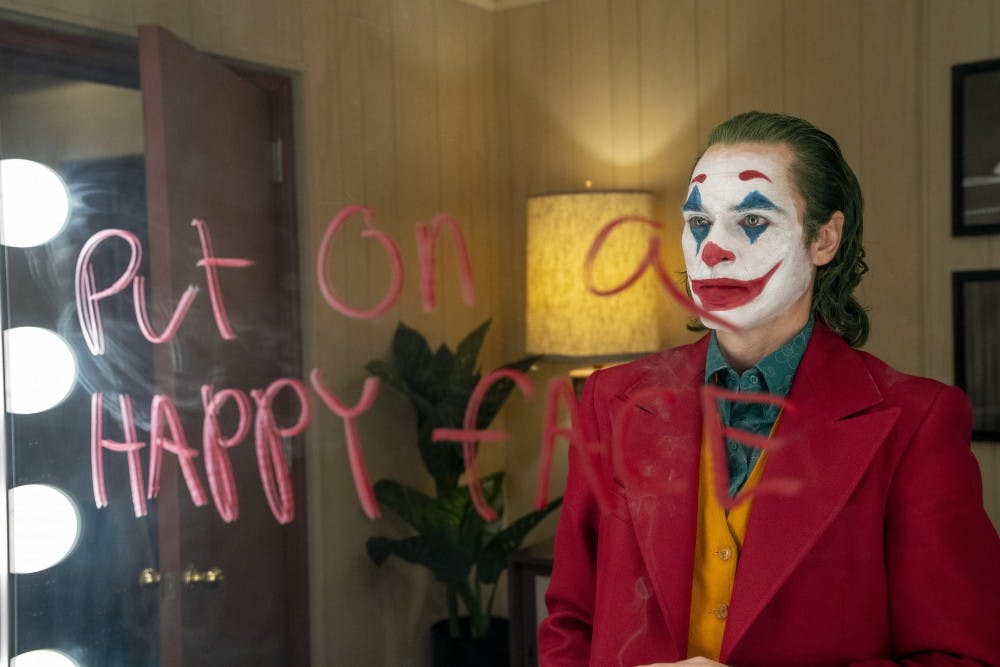You’ve probably heard something about Joker, the 2019 origin story of Batman’s famous arch–nemesis. Before it was even released, it already saw a handful of scandals, including its lead actor, Academy Award–nominated Joaquin Phoenix, reportedly walking out on set and cussing out his cinematographer, its director Todd Phillips insisting that he couldn’t make his Hangover series today because of “woke culture”, and a few audience concerns over a repeat of the Aurora shooting in 2012, which took place at a screening of The Dark Knight Rises. However, all of these stories and the criticisms that have followed them are not based on the actual content of the film—only the media circus surrounding it. What, then, is Joker actually about? Does it warrant all this criticism?
The answer is: kind of. Joker is a muddled mess of a movie, not for its technical elements, but for its writing. Is it a drama or a comedy? A critique of the wealthy or of the poor? Should we think that the Joker is justified or absolutely horrendous? “Maybe,” it seems to say, masking its plot in heavy–handed “we live in a society” commentary, and hiding its genuine meaning in vague critiques of America.
The first issue with Joker is that Todd Phillips does not know how to write a drama. The first thirty minutes of the movie are filled with heady grittiness, featuring not–yet–turned–Joker Arthur Fleck going about his dreadful daily life. Fleck is a man beaten down by the system. The movie informs us, with the subtlety of a baseball bat, that Fleck is mentally ill, was previously housed in Arkham Asylum, and is not adjusting well to the world. He works as a clown on the streets of Gotham—modeled from 1980s New York—where he gets unnecessarily pummeled by a group of teenagers. These moments of horror are played rightfully straight, but Phillips fears audience boredom and throws cheap laughs in—Leigh Gill, who is four feet tall, was cast entirely for a bit where his character can’t reach the lock on Fleck’s door. Humor, which is an important part of Joker—Fleck is an aspiring comedian—feels completely out of place within the movie. Are we supposed to be sympathizing with the horrors Fleck experiences or laughing at his blunders?

Other moments in Joker are just strange. At one point, Fleck’s coworker inexplicably hands him a gun, fully loaded, because apparently he needs to protect himself. Fleck fires that same gun on a whim at the wall inside his house, to which he comically collapses and scrambles to hide the evidence. On the subway home, three businessmen taunt Fleck by singing Stephen Sondheim’s "Send in the Clowns". Where they found the time to coordinate a musical theater tune, we may never know. The wealthy of Gotham attend a showing of Charlie Chaplin’s Modern Times dressed to the nines, which likely would have an interesting political implication if the movie cared to ruminate on it. These moments are just peculiar and oddly placed, taken seriously for some reason though they feel painfully contrived.
But this is far from Joker’s greatest sin. Unsurprisingly, the film ends up being political—how could it not, with the Joker’s corruption being spurred by society in this movie, rather than a result of being dumped into a vat of chemicals—but it fumbles. Fleck accidentally kills three wealthy young men on a subway and inspires a revolution led by the poor people of Gotham City. Yet, ultimately, he declares to talk–show host Murray Franklin (Robert de Niro) that “I’m not political.” The movement, defined by its vague anarchy, is a proto–Occupy Wall Street. The poor people of Gotham are rallying against the wealthy and income inequality, particularly targeting the iconic Thomas Wayne (Brett Cullen), who is running for mayor.
The flaw with basing this revolution on the actual strifes of the oppressed? The poor people in this scenario are not just fighting for income equality—they’re literally supporting murder. Cold–blooded murder, at that. Fleck's murders have no political motivation, and still, a movement rallies on behind him. The implication that poor people would actively advocate for murder because it harmed the wealthy is not only ridiculous, but harmful. While an audience may spend the first section of the film sympathizing with the lower–class of Gotham, them rallying behind murder makes it nearly impossible to read their movement as anything other than ridiculous.

Photo by Niko Tavernise | © 2019 Warner Bros. Entertainment Inc. All Rights Reserved
Beside those of the political movements, Fleck—in his descent—ends up murdering quite a few people, first complete strangers and then his close associates. An important concern of viewers was whether these murders were presented as validated or not by the narrative. However, it is not really all that clear–cut. These deaths are filmed in an excessive, gory way, portraying Fleck as acting with overzealous violence. On the other hand, the film always cares enough to present a reason for these murders. This was a concern of many reviewers—why would the movie present Fleck as justified in killing people, even if he may have been wronged by them? Fleck is clearly oppressed by the system, but so are many of those around him.

Despite all this, there are some good parts of Joker. Its cinematography is well–done, its set design is atmospheric, and its soundtrack sounds lovely, peppered with Frank Sinatra’s "That’s Life" and other '50s and ‘60s songs to incredible effect. Phoenix’s performance is one for the ages—he apparently lost over 50 pounds for the part—and, even if the film doesn’t get any award season attention, it would be a surprise if Phoenix didn’t. However, one tweet rings alarmingly true for Joker: it's “what happens when you set out to make a college dorm room poster movie on purpose.” It's a film that already believes it’s going to be an indie hit, adored by male audiences and asserted by artistic posters plastered on their dorm walls. The film’s aesthetics are lovely, but don’t feel entirely earnest. It makes grand, sweeping claims about society as a whole, the place of the impoverished within it, and the way people cope with these sufferings—but it all looks like it’s for show.
Joker should’ve been better. Its trailer was fantastic, its was casting perfection, and its premise showed promise. Instead, when facing the massive political implications of this new iteration of the character, the film stumbled, making this rendition hollow.

